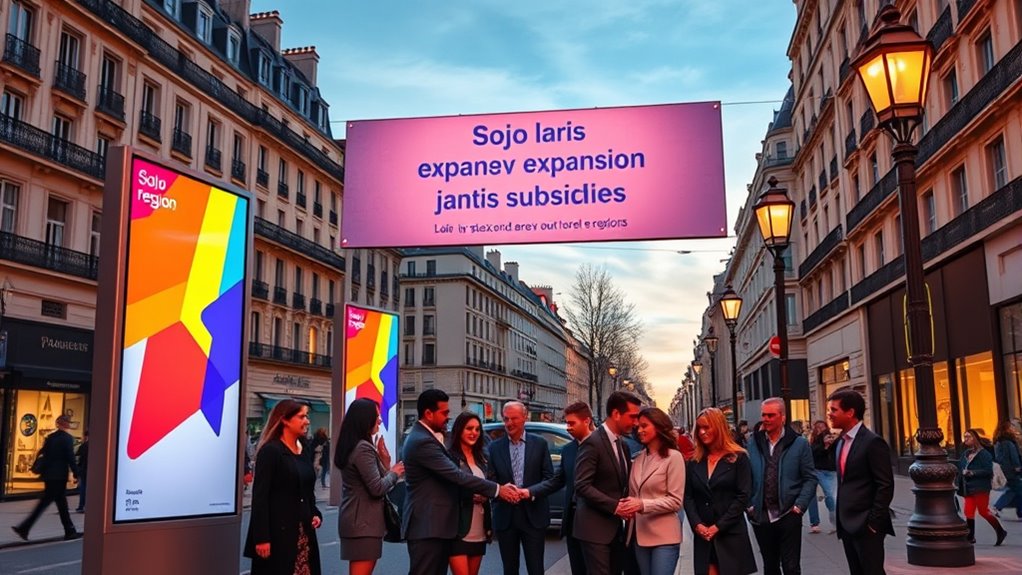Laws and subsidies in the Paris region actively support repair services like Sojo by mandating product repairability labeling, providing government incentives, and offering regional grants that promote sustainable retail. These measures make repairs more affordable and accessible, encouraging consumers to choose repair over replacement. Strategic partnerships, like with Westfield, amplify visibility and access. If you want to find out how these policies can boost your options, there’s more to explore below.

France’s new laws and subsidies are making it easier for repair companies like Sojo to expand into the Paris region. The government has introduced legislation that mandates manufacturers to ensure products are repairable, which directly encourages repair businesses to grow. These regulations not only promote sustainability but also create a more transparent environment for consumers by implementing repairability labeling. When you visit a repair shop in Paris, you’ll notice clear labels that help you understand how easily your clothing or footwear can be fixed, boosting your confidence in repair services and making you more likely to choose repairs over replacements.
Additionally, the government offers specific subsidies for clothing and footwear repairs. These financial incentives lower the cost barriers for consumers, encouraging you to opt for repairs instead of buying new items. When you have a garment fixed, the out-of-pocket expense is reduced thanks to these subsidies, making repairs more affordable and accessible. For repair companies like Sojo, these subsidies mean increased demand as more consumers are motivated to repair rather than replace. The incentives also extend to businesses investing in repair infrastructure or new technologies, supporting their growth and innovation. Regional grants further bolster sustainable retail initiatives, helping repair businesses establish a solid presence in Paris.
Partnering with Westfield Shopping Centres, Sojo is strategically positioning itself at Westfield Les 4 Temps in Paris, a location known for attracting high foot traffic and visibility. By partnering with Westfield, Sojo benefits from an established retail ecosystem that draws environmentally conscious urban shoppers like you. This collaboration allows Sojo to connect with consumers who prioritize sustainability and repair solutions, aligning perfectly with Paris’s growing repair culture. The Westfield location also supports Sojo’s integrated approach, blending in-person services with online booking options to enhance your convenience when seeking repairs or alterations. The city’s commitment to sustainability initiatives further supports this expansion, creating a favorable environment for eco-friendly services.
The Paris region is particularly ready for repair services, thanks to a consumer base that values sustainability and circular economy practices. You’re likely to see more local brands and retailers offering repair and alteration options, driven by legislation and consumer demand. This environment reduces barriers for specialized repair providers like Sojo, making it easier for them to establish and expand their presence. Sojo’s innovative service model, which combines on-site hubs with flexible options like home delivery and in-person consultations, is well-suited to meet Paris’s eco-conscious market. With government support and a receptive consumer base, Sojo’s expansion into Paris is set to thrive, bringing sustainable repair solutions closer to you and enhancing the city’s reputation as a leader in retail sustainability.
Frequently Asked Questions
What Specific Law Provisions Aid Sojo’s Expansion?
The law provisions that aid your expansion include regulations requiring transparent repair information and accessible spare parts, which build consumer trust. Supportive subsidies for repair services and repair hubs make your offerings more affordable and visible in retail spaces. Additionally, laws promoting partnerships between repair providers and retailers, along with consumer rights to repair without voiding warranties, help you establish a strong, compliant presence in the Paris region.
Are There Eligibility Criteria for Subsidies in Paris?
Yes, there are eligibility criteria for subsidies in Paris. You must be located in designated districts like QPV or meet specific demographic requirements, such as age or employment status. Your business should be new or in early stages, often under a year old, with fewer than 50 employees. Additionally, you need to provide proof of residency, recent tax assessments, and meet other administrative conditions to qualify for various grants and subsidies.
How Long Does the Approval Process Typically Take?
If you’re expanding your business to Paris, expect the approval process to take about 3 to 6 weeks when everything’s prepared smoothly. For example, setting up a subsidiary might involve filing documents, registering your company, and obtaining necessary licenses. Delays happen if paperwork is incomplete or if sector-specific approvals are needed. By ensuring thorough preparation, you can streamline the process and move forward more quickly.
Are There Tax Incentives Linked to This Expansion?
You benefit from several tax incentives linked to this expansion. French laws offer tax benefits for sustainable practices, including reduced VAT on repair services and green business tax credits. These incentives lower your overall tax burden, making it financially advantageous to expand. Additionally, local tax relief schemes support employment and sustainability efforts, further encouraging your growth in the Paris region. By leveraging these incentives, you can maximize your operational efficiency and environmental impact.
Will Subsidies Cover All Expansion-Related Costs?
While subsidies might ease some of your expansion challenges, they won’t cover all costs. You’ll find that expenses like leasing, hiring, and infrastructure typically require private funding or investments. Subsidies mainly support repair activities and consumer affordability, acting as helpful supplements rather than full financial backers. To succeed, you’ll need a mix of private capital, strategic planning, and leveraging government support to navigate the full scope of your expansion costs.
Conclusion
With the support of favorable laws and subsidies, Sojo is poised to make a big impact in the Paris region. Did you know that recent policies could boost local startups’ growth by over 30%? As you see, government backing isn’t just helping Sojo expand—it’s transforming the entire entrepreneurial landscape. This momentum shows how strategic support can turn ambitious plans into reality, creating new opportunities for everyone involved. The future of Sojo in Paris looks brighter than ever.









